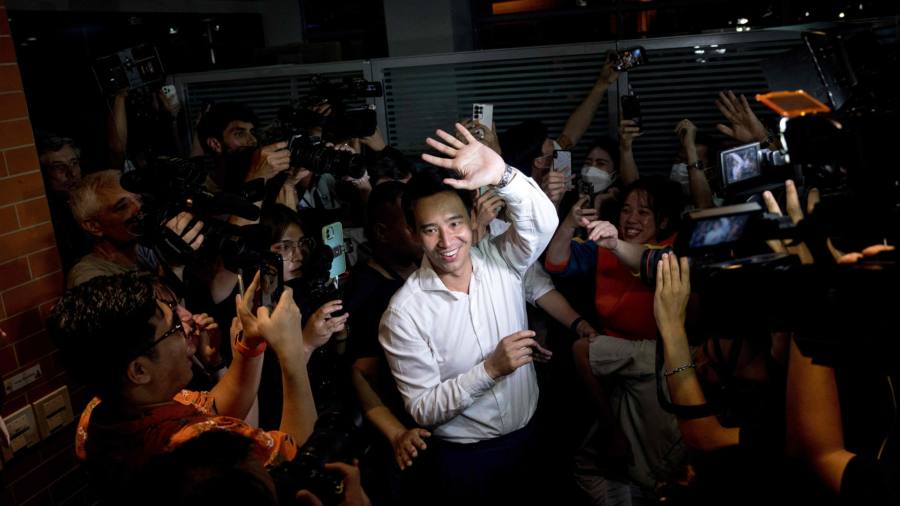Thailand’s pro-democracy opposition parties have scored a resounding victory in general elections, as voters delivered a rebuke to the military in a closely watched contest that could herald the country’s first transfer of power in a decade.
The progressive Move Forward party and the Pheu Thai party are together projected to win about 290 seats in Thailand’s 500-seat lower house, based on preliminary results from the Election Commission.
Pita Limjaroenrat, Move Forward’s Harvard- and MIT-educated leader, wrote on Twitter on Sunday that he was “ready” to be prime minister. “We believe that the Thailand that we love can be better. Change is possible.”
He said that he expected his party would begin coalition talks with Pheu Thai, led by Paetongtarn Shinawatra, the youngest daughter of billionaire telecoms magnate and populist former prime minister Thaksin Shinawatra. His elected government was overthrown in a military coup in 2006.
But after a decade of coups, crackdowns and political turmoil, it remains far from clear if either opposition party will be able to lead the next government. Under parliamentary rules written by the military after a coup in 2014, an upper house stacked with pro-military appointees stands to block an opposition prime minister.
Thais vote for constituency MPs as well as for a party, which is then allocated additional seats proportionally. Move Forward has 113 constituency seats, against Pheu Thai’s 111 so far. Final results may not be available for weeks.
Move Forward’s success in its second nationwide poll reflects a backlash against Thailand’s deeply conservative royalist-military establishment as well as the party’s popularity among urban and young voters following anti-monarchy protests in 2020. In Bangkok, the capital, it won 31 of 32 seats.
The party’s supporters “have grown up in a time of political polarisation marked by protests, coups, and crackdowns”, said Napon Jatusripitak, a research fellow at the Singapore-based Iseas-Yusof Ishak Institute.
Pheu Thai, which had won every election since 2001, remains popular across the country’s rural north-east, where Thaksin’s anti-poverty policies are remembered fondly.
Military-aligned parties were handed a sweeping defeat, with the United Thai Nation party, a vehicle for incumbent prime minister Prayuth Chan-ocha, receiving only about 9 per cent of the vote for 23 constituency seats.
The ruling Palang Pracharath party, which is led by Prayuth’s deputy and longtime mentor Prawit Wongsuwan following a schism within the government, had 10 per cent for 39 seats.
Prayuth, a former military chief who seized power in 2014 by deposing Thaksin’s sister Yingluck Shinawatra, had been denounced by human rights groups for repressing civil liberties and crushing the 2020 protests. On Sunday, he said that he “respects democracy and the election”.
The opposition’s forceful showing may not translate into control of the government. The military maintains a significant advantage under Thailand’s 2017 constitution, which allows a 250-member junta-appointed senate to vote alongside the 500-seat elected lower house on a prime minister. This creates a threshold of at least 376 seats for the opposition to secure its own prime minister and form a government.
One possible kingmaker is the regional Bhumjaithai party, which placed third with 12.7 per cent of the vote, enough for 68 constituency seats.
There is also the risk of either a military takeover or judicial intervention to disqualify opposition candidates.
Move Forward’s Pita is already the subject of a complaint to the election commission over his ownership of shares in a broadcaster. The leader of an earlier incarnation of Move Forward was banned from politics for 10 years for a similar breach.
Move Forward’s proposals for reforming the military and monarchy, including ending conscription and amending the harsh lèse majesté law, may also prove an obstacle in coalition talks.
Its agenda is viewed by the establishment as “an existent threat”, according to Thitinan Pongsudhirak, director of the Institute of Security and International Studies at Chulalongkorn University in Bangkok.
“It’s going to be very difficult to reform the old order without some kind of a confrontation,” he said.
Read the full article here
